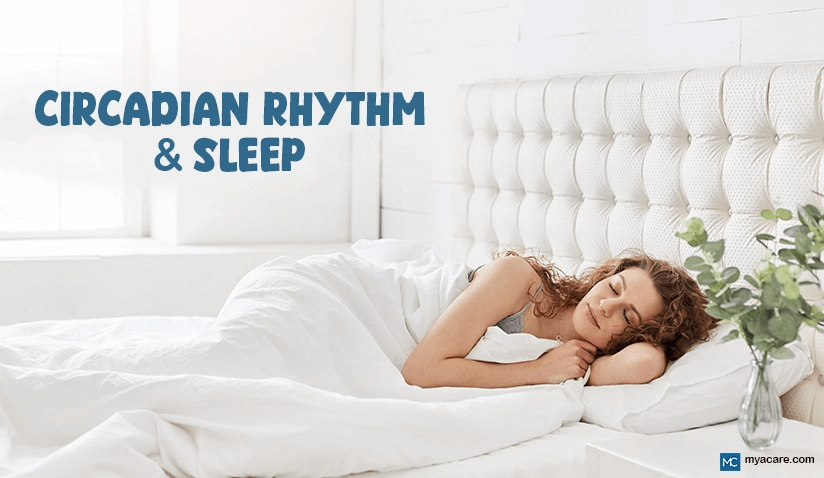Circadian Rhythm and Sleep

How Does The Circadian Rhythm Work
Factors Impacting The Circadian Rhythm
The biological rhythms are a natural cycle of alteration in our body's functions and chemicals. It is also like an internal clock located in the brain near the eyes that regulates the other clocks in our mind.
- Circadian rhythm; it is the 24-hour cycle, including physiological and behavioral rhythms.
- Diurnal rhythm; the rhythm synced with day and night
- Ultradian rhythm; the shorter period rhythm with higher frequency than circadian rhythm
- Infradian rhythm; the cycle that lasts for more than 24 hours, for example, the menstrual cycle.
Circadian Rhythm
The word circadian comes from the Latin phrase "circa-diem," meaning around the day. Your body has an internal clock that might not tick every second. Still, it performs essential functions and biological processes in 24 hours, such as hormone secretion, sleep-wake cycle, body temperature regulation, glucose homeostasis, and cardiovascular health.
The external factors influence the circadian rhythm in the environment, like light and dark. This circadian clock in the brain synchronizes in order to control the internally driven cycles to work together.
How Does The Circadian Rhythm Work; Physiological Processes
Various components make up your body's circadian rhythm. During the 24 hour cycle, the body's processes are optimized at multiple points. There are thousands of small nuclei or nerve cells residing in the hypothalamus area of the brain, making up a suprachiasmatic nucleus that is controlling your rhythms. It receives direct input from the eyes. These nuclei act as the control centers connecting to the other parts of the brain.
The most crucial factor in setting your 24-hour circadian clock is "light." These time cues of sunlight and dark are used to set from day to day. It is one reason why blind people normally have issues with their sleep. Your body is naturally wired to sleep when it is dark while it tends to stay awake in daylight.
Does The Body Produce And Hold Its Own Circadian Rhythm?
The answer to this question is "yes." Natural factors in your body, like your genes, produce these circadian rhythms. In the human body, some of the most critical genes through this process are:
- Period gene
- Cryptochrome gene
At night time, these are the two genes that code for proteins to build up in the cell's nucleus and lessen during the daytime. They are basically photoreceptors activating the feelings of wakefulness, alertness, and sleepiness. However, environmental signals affect circadian rhythms, like exposure to extreme light at night oddly excites the period and cryptochrome genes.
Factors Impacting The Circadian Rhythm
An adequately aligned master clock can promote restorative and consistent sleep, but it creates problems when thrown off. Hence, the following factors affect or impact the circadian rhythm:
- Sleep and wakefulness
- Body temperature; rises during the last hours of sleep, i.e., just before waking up. It drops at night as the sleep time draws in.
- Different hormonal changes
- Metabolism; The circadian clock is one of the primary regulators of metabolism, and it has a bidirectional effect on the metabolic process and energy balance.
- Mutations or changes in genes
- Environmental or external factors like lights from electronic gadgets at night confuse our circadian clock.
Role Of Hormones And Sleep
Hormone levels fluctuate according to the light and dark cycle. The metabolism and management of many hormones are influenced by the interactions of sleep effects and intrinsic circadian rhythms. Following are the hormones correlated with sleep and circadian rhythmicity:
- Ghrelin
- Melatonin
- Growth hormone
- Cortisol
- Leptin
Growth hormone levels increase during sleep and reach the pinnacle following sleep onset. It is intermittently secreted during sleep in healthy individuals, while in posttraumatic stress disorder or disturbed sleep patterns in a person, the growth hormone exhibits low plasma levels.
Melatonin depicts robust circadian rhythmicity. Some studies demonstrate that the levels of melatonin are high during the night versus daytime. It plays a significant role in sleep regulation. According to a research study conducted on some patients, it was concluded that melatonin didn't influence body temperature or sleep initiation but facilitates maintenance of the sleep-wake cycle.
Cortisol hormone is the stress hormone that rises in the middle of the biological night and peaks during the morning. The levels are reduced during slow-wave sleep, which is the deepest phase of Non-Rapid eye movement phase (NREM) sleep. Cortisol helps to alert your body.
Changes That Upset Circadian Rhythm
Shift Workers
The circadian cycle is disturbed in shift workers during the night work and daytime sleep, where the melatonin levels were significantly decreased compared to the daytime workers. According to a research study, serum cortisol in the morning is also decreased by 20 to 40 percent in night shift workers. Chronic reductions in these hormone secretions might exert a carcinogenic effect.
Jet Lag
Jet lag happens when a person is changing time zones quickly—for example, flying from the US to an Asian country. You can adjust your watch timely, but it gets hard for the body to comprehend this time variation leading to the following symptoms of jet lag:
- Insomnia
- Indigestion
- Daytime sleepiness
- Poor concentration
- Irritability
Mental Health Problems and Irregular Sleep-Wake Rhythm
Stress and depression bring hormonal changes which affect our sleep patterns and disrupt the circadian cycle of our body. When we have irregular sleep patterns, our body drifts and cannot find a particular time to sleep, creating symptoms much like those related to jet lag.
Conclusion
Circadian rhythm is the body's natural 24-hour cycle that facilitates a healthy sleep-wake schedule. Research studies suggest that certain hormones and metabolic processes are influenced by circadian rhythms and sleep quality. Circadian disruption may negatively affect one's health.
To search for the best Neurology Healthcare Providers in Croatia, Germany, India, Malaysia, Spain, Thailand, Turkey, Ukraine, the UAE, UK and the USA, please use the Mya Care search engine.
Sources:
Featured Blogs



